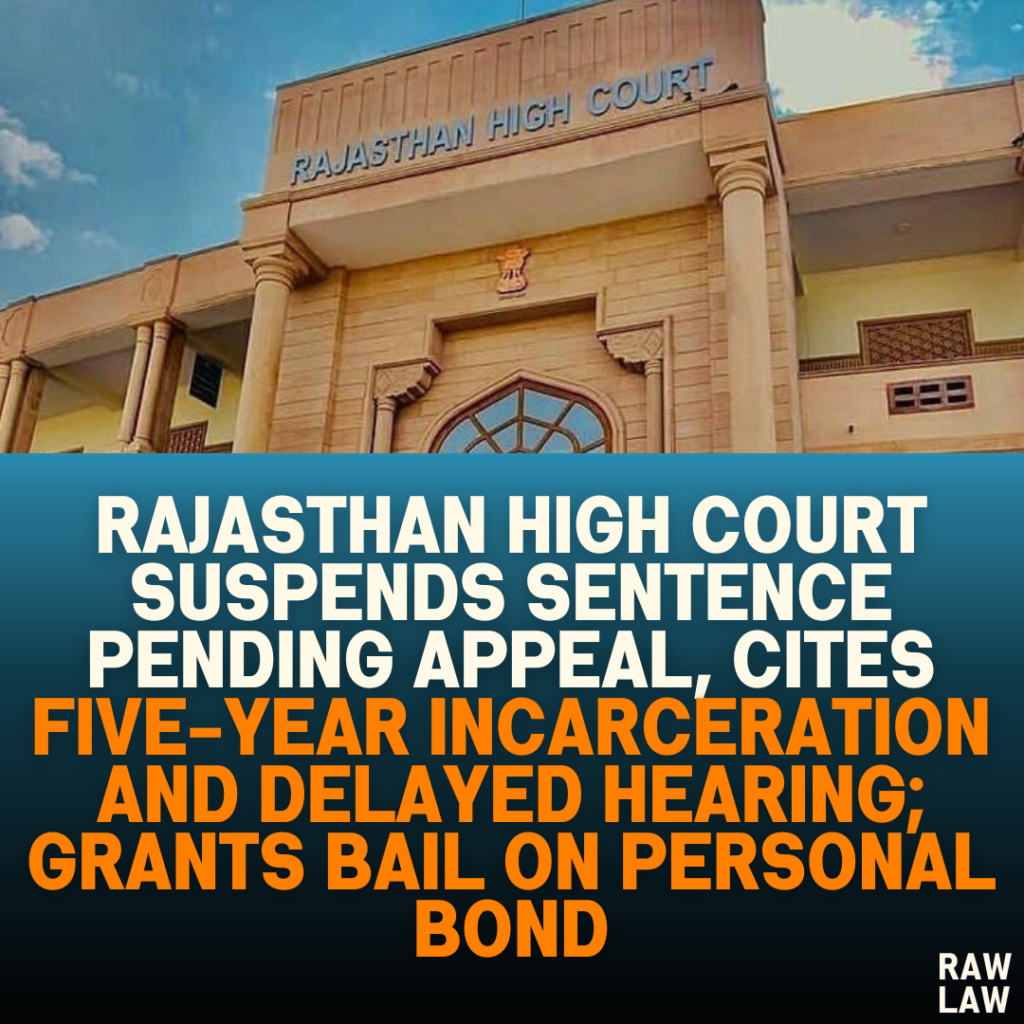Court’s Decision:
The Rajasthan High Court granted bail to the appellants by suspending their sentences, noting the fact that one of the appellants, Tara Chand, had already been incarcerated for more than five years out of his ten-year sentence. The Court found that the appellants had sufficient grounds to challenge the trial court’s conviction, making it a fit case for the suspension of sentences during the pendency of the appeal.
Facts:
The appellants were convicted by the trial court for offenses under Sections 341/34, 323/34, 307/34, and 304/34 of the Indian Penal Code (IPC) in connection with an incident involving a fatal head injury. The trial court sentenced them to a maximum of ten years’ imprisonment. The appellants sought suspension of their sentences pending an appeal.
Issues:
The key issue was whether the appellants should be granted suspension of their sentences while the appeal was pending, given that they had already served a significant portion of their sentences.
Petitioner’s Arguments:
The counsel for the appellants argued that the trial court wrongly convicted them, failing to correctly appreciate the evidence. The main allegation of causing the fatal head injury was against Tara Chand, who had already served more than five years. There were no allegations of direct involvement in the fatal injury against the other appellants. Furthermore, the appellants had been on bail during the trial and had not misused their liberty. Considering the prolonged incarceration and the lack of an immediate hearing date for the appeal, the counsel urged the court to suspend their sentences.
Respondent’s Arguments:
The State counsel opposed the application for suspension of sentence, arguing that the appellants were rightly convicted and did not merit any leniency in sentence suspension.
Analysis of the Law:
The Court considered the provisions under which the appellants were convicted, especially Section 304 of the IPC, which pertains to culpable homicide not amounting to murder. The Court also examined Section 430 of the B.N.S.S., under which the application for suspension of sentence was made.
Precedent Analysis:
Although no specific previous judgments were cited in this case, the Court evaluated the standard principles governing the suspension of sentences, particularly in cases where a substantial part of the sentence has already been served, and there is no immediate likelihood of the appeal being heard.
Court’s Reasoning:
The Court noted that the primary allegation of causing the fatal head injury was against Tara Chand, who had already served more than half of his ten-year sentence. Moreover, the other appellants did not face specific accusations related to the fatal injury. Given these facts and the likelihood of a long delay in the disposal of the appeal, the Court held that the appellants had strong grounds to challenge the trial court’s judgment. Consequently, the Court deemed it appropriate to suspend their sentences pending the appeal.
Conclusion:
The Rajasthan High Court allowed the application for suspension of sentence and granted bail to the appellants. They were directed to furnish a personal bond of Rs. 50,000 with two sureties of Rs. 25,000 each, with the condition that they would appear before the trial court annually until the appeal is resolved.
Implications:
The decision highlights the Court’s consideration of prolonged incarceration and the lack of immediate prospects for hearing an appeal as significant factors in granting sentence suspension. It sets a precedent for similar cases where appellants may seek bail during prolonged appeal proceedings.



